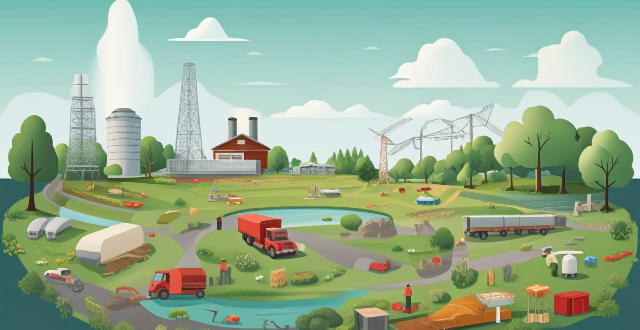Importing food has significant environmental implications, including increased transportation emissions, land use changes, water consumption, and energy use. However, strategies such as reducing food waste, supporting local agriculture, choosing sustainable foods, and improving energy efficiency can help mitigate these impacts and promote sustainable practices.

Environmental Implications of Importing Food
Importing food has become a common practice in many countries, especially those with limited agricultural capabilities or diverse dietary preferences. However, this practice has significant environmental implications that must be considered to ensure sustainable development and protect the planet's resources. In this article, we will discuss the various environmental impacts of importing food and explore ways to mitigate these effects.
Transportation Emissions
One of the most obvious environmental implications of importing food is the increased transportation emissions. When food is transported from one country to another, it requires fuel-powered vehicles such as trucks, trains, and ships. These modes of transportation contribute to greenhouse gas emissions, which are a leading cause of climate change. The longer the distance the food travels, the greater the environmental impact.
Key Points:
- Increased transportation emissions contribute to climate change.
- Longer distances traveled by food result in higher environmental impacts.
Land Use Changes
Another environmental implication of importing food is land use changes. As countries rely more on imported food, there may be less incentive to maintain local agriculture and conservation practices. This can lead to deforestation, loss of biodiversity, and soil degradation. Additionally, some countries may convert their agricultural land for other purposes, such as urban development or industrialization, further exacerbating land use issues.
Key Points:
- Reliance on imported food can lead to reduced local agriculture and conservation efforts.
- Land use changes can result in deforestation, loss of biodiversity, and soil degradation.
Water Consumption
The production of certain foods often requires significant amounts of water. For example, producing one kilogram of beef can require up to 15,000 liters of water. When countries import food that requires large amounts of water to produce, they are essentially exporting their water consumption to another region. This can have negative consequences for local water resources and ecosystems in the exporting country.
Key Points:
- Producing certain foods requires significant amounts of water.
- Importing water-intensive foods can have negative consequences for local water resources and ecosystems in the exporting country.
Energy Use
The production, packaging, and transportation of food all require energy. When countries import food from distant locations, they are effectively increasing their energy consumption due to the additional processes involved in getting the food to market. This increased energy use contributes to greenhouse gas emissions and can also put strain on local energy resources.
Key Points:
- Producing, packaging, and transporting food requires energy.
- Importing food from distant locations increases energy consumption and associated environmental impacts.
Mitigating Environmental Impacts
While importing food has its environmental drawbacks, there are ways to mitigate these impacts and promote sustainable practices. Some strategies include:
- Reducing Food Waste: By reducing food waste at both the consumer and producer levels, less food needs to be produced and transported overall.
- Supporting Local Agriculture: Encouraging the consumption of locally grown food reduces transportation emissions and supports sustainable land use practices.
- Choosing Sustainable Foods: Selecting foods that have lower environmental impacts, such as plant-based proteins or sustainably caught seafood, can help reduce the overall environmental footprint of the food system.
- Improving Energy Efficiency: Investing in more efficient transportation methods and production processes can help reduce energy consumption and associated emissions.
Key Points:
- Strategies exist to mitigate the environmental impacts of importing food.
- Reducing food waste, supporting local agriculture, choosing sustainable foods, and improving energy efficiency are effective approaches.
In conclusion, while importing food provides access to a wider variety of products and can support economic growth in both exporting and importing countries, it also has significant environmental implications that must be addressed through sustainable practices and policies. By working together to reduce our collective environmental footprint, we can enjoy the benefits of global cuisine while also protecting our planet for future generations.